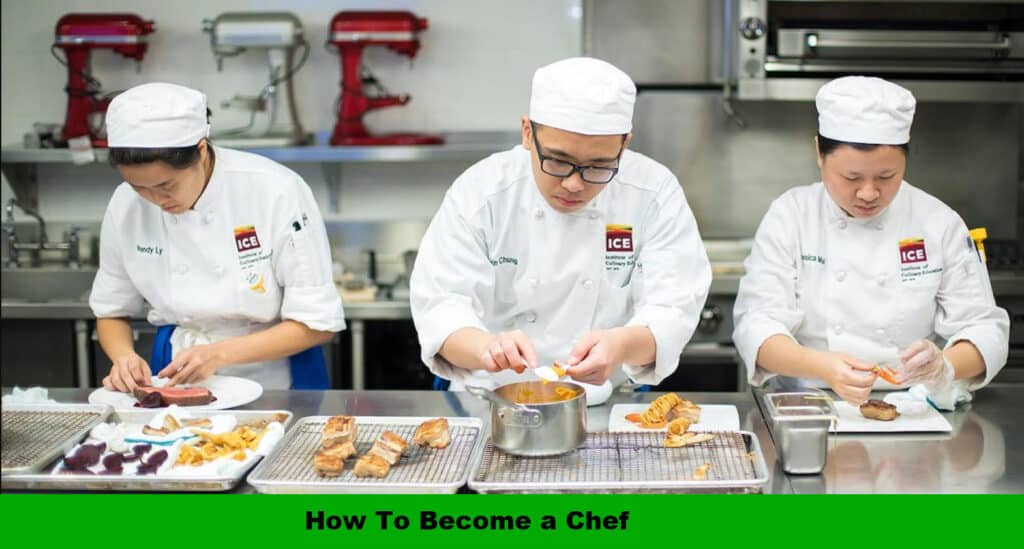How to Become a Chef (31+ Important Facts)

Anybody who likes to cook has probably wondered how to become a chef and what it would be like to work as a high-end chef. But in truth, it takes time to follow the path of becoming a chef. It takes endless hours of laborious work, particularly in the beginning. But if you don’t mind the hurdles it takes to get there, stay tuned as we’ve outlined successful guidelines you could follow.
How to Become a Chef? To Become an Outstanding Chef, You Must Like Cooking. A Good Taste Can Distinguish and Dissolve Flavors. Chefs Must Be Meticulous. Pressure and Lengthy Hours Need Complete Focus. You Must Work Well with Management, Kitchen Porters, Waitstaff, and Other Chefs.
You don’t need to meet any specific educational or training criteria. Most get the skills and information while working those long hours in the kitchen. However, people who desire to become head chefs may choose to pursue a degree in culinary arts and an internship. Let’s dive in deeper.
What Is a Chef, Exactly?
A chef is a manager who oversees the kitchen and may also be in charge of developing menus, setting prices, controlling costs, and managing timetables. So while completing culinary school is a piece of the jigsaw, it is insufficient.
A chef does kitchen management. A chef designs the menu, controls the spending, sets the prices for menu items, makes the food, buys the ingredients, ensures the service is of a high standard, assures safety, and supervises the workers to ensure everything runs well.
What Kind of Training Is Necessary to Work As a Chef?
You can start your training to become a chef without official qualifications. We advise taking English and math at the GCSE level, with a C/4 or higher. This will increase the range of apprenticeships, courses, and qualifications you can apply for, both now and later in your career, in addition to demonstrating your proficiency in basic literacy and numeracy.
There is no one set of requirements for becoming a chef. Once you have graduated from high school or college, you have a variety of options:
- You could apply for a position in a kitchen
- Begin apprenticeship
- Learn to earn a diploma or other credential.
What Is the Timeline for Becoming a Chef
The timeline for becoming a chef is based on the program length of the culinary school chosen; culinary school can last anywhere from a few months to four years. When you enrol, there are various options you can select and variables that can impact how long your studies will last.
It would take many more years to become a head chef by obtaining experience in commercial kitchens. The tricky part is deciding which is best for you.
Steps to Becoming a Chef
The practical step to becoming a chef is as follows:
Get Yourself a Job in the Kitchen of a Local Restaurant.
To become a chef, you must first understand kitchen and restaurant operations. Be advised that this first job may involve menial duties like cleaning up after yourself and putting out the trash. You’ll learn if this is suited for you by being exposed to specialists in the kitchen, though.
Get a High School Diploma or Ged.
It would help if you had a high school diploma to continue culinary school. Earn this crucial diploma because admission to most apprenticeship programs requires a high school certificate or GED. State-specific GED programs vary, but most cost $150 or less.
Consider Career Options and Specializations.
Before reading about becoming a chef, know what this line of work requires. It involves more than just cooking. Managing and training workers, creating menus and recipes, ordering food and kitchen supplies, and other restaurant management duties are all done by chefs.
Go to Culinary School.
The duration of time spent in culinary school varies widely per curriculum. Master’s degrees in the culinary arts are unusual in the United States, with a certificate, associate’s degree, or bachelor’s degree being the most frequent outputs. A culinary degree is not necessary to enter the field. Still, those with one often find themselves in positions of more responsibility far more quickly.
Learn more about your culinary education opportunities below.
Culinary School:
Whatever degree, certificate, or diploma you receive as a result of attending a culinary school, the curriculum places a lot of emphasis on what it takes to become a chef. One to four years may pass along this route. Culinary schools are excellent places to start your career as a chef, even though they are typically more expensive due to the quality of the staff, training, and current facilities.
Community College:
Like many culinary schools, community colleges typically offer an associate’s degree, diploma, or certificate in culinary arts. But attending community institutions can be less expensive. Community colleges provide a more well-rounded degree by allowing students to take a few general education classes.
Vocational / Trade School:
A program at a vocational or trade school might be one of the easiest methods to get training in cooking. Some programs connect to nearby high schools, where juniors or seniors can pick up valuable skills to help them jump-start on a culinary degree or be ready for entry-level employment. Other courses teach specialized culinary techniques, readying students to enter the kitchen immediately. These courses are designed for high school graduates or GED holders.
Four-Year Schools:
An extensive program will be required to earn a bachelor’s degree. For instance, an average culinary arts degree will teach management, business, and marketing principles to prepare graduates to manage a restaurant or other food-related enterprise. Additionally, the student will be taught a wide range of cuisines and cooking techniques.
Start Working in a Restaurant Kitchen. (Obtain Practical Work Experience)
It doesn’t end with the formal culinary program. Fresh grads usually won’t start working as chefs immediately because becoming a chef requires a lot of experience. The skills and knowledge required of every chef will be enhanced by additional training under a professional’s guidance, whether through an internship, an apprenticeship, or just regular work. Work experience also presents a fantastic networking opportunity.
Get Your First Chef Job.
It can be beneficial to work a part-time job or do an internship while enrolling in a culinary program to gain experience. You can apply for full-time work in kitchens after you graduate. Alternatively, you can do an apprenticeship where you’ll get paid and earn real-world experience.
Make sure to mention your culinary arts diploma or degree, as well as any related experience, when you apply for positions. As a chef, there are numerous prospects for progress, so keep working hard and developing your skills to obtain promotions.
Climb the Ladder
Although it can be helpful to learn how to become a chef, a culinary school cannot ensure your success. It’s doubtful that you’ll be hired as a head chef right after school. You’ll need to work hard and learn management skills to impress your boss.
Become the Right Hand
When it comes to gaining experience, the sooner, the better. Start working in a restaurant as soon as you finish culinary school. Ideally, your culinary school will have a restaurant where you can get experience, but if you have the time, you can also spend a few hours on the side. Additionally, the more contacts you have in the field and the more people you interact with and impress, the easier it will be for you to launch or improve your profession.
Pursue certification.
Although getting culinary certification to become a chef is not necessary, it could give you an edge.. The American Culinary Federation grants 16 different certificates, andis the largest organization of chefs in North America. Multiple qualifications could help you stand out as a candidate in the culinary industry.
Become the Executive Chef
Some sous chefs advance to executive chef positions, which necessitates the departure of the current executive chef. To move from sous chef to executive chef, you might need to look for a new kitchen if your boss is firmly established and has no intention of leaving anytime soon.
You might even be your boss and own a bar, food truck, or “ghost restaurant,” depending on your level of entrepreneurial inclination. Many chefs before you have found that earning a degree in the culinary arts gives them a leg up in their chosen field and helps them advance more quickly in their careers.
Education Is the First Step; Never Forget This.
Since so many variables are at play, it’s difficult to say how long it will take one individual to become a chef.
But one thing is sure: starting is the best way to get there. With a degree and certificate program that can get you a comprehensive education in 15 months or less, you may make rapid progress from where you are today to a place that is light years ahead.
FAQS
What Does a Chef Need to Know?
Along with the capacity to create recipes, arrange menus, and guarantee the highest quality of the meals they serve, successful chefs also need strong business and interpersonal abilities. Managing personnel and creating a budget for spending. Giving workers guidelines in a clear and compelling manner
How Do I Start to Become a Chef?
You need work experience in a commercial kitchen to become a chef. To acquire the deeper technical facets of the field, many cooks attend culinary schools or obtain a diploma or associate degree at a community college.
How Long Will It Take You to Become a Great Chef?
Programs for culinary instruction could span from one to four years. It would take many more years to become a head chef by obtaining experience in commercial kitchens.
What Are the Three Typical Ways to Become a Chef?
The three typical ways to become a chef are:
- Getting a job in the kitchen of a restaurant.
- Obtaining a GED or high school diploma.
- Attending a culinary program
How Much Do Chefs Earn?
Let me give you a quick breakdown. According to the Bureau of Labor Statistics of the United States, the average salary of a chef or head cook is $58,740 per year or $28.24 per hour. The lowest paid get $30,300 per year, while the most paid earn an average of $110,000 per year. The average yearly compensation for a chef is $90,790.
The type of chef, level of education, number of years of experience, kind of place they work at, and location of the business are all factors that affect a chef’s pay.
Is a Chef a Promising Career?
Deciding on what career to follow is challenging, and thus it shouldn’t be a decision that is rushed. Although working as a chef is a fantastic career choice, it has its challenges. Even while the long hours, physical demands, and low starting income can be challenging, a career in the food service industry will reward you with a rewarding position that allows for a great deal of freedom and creativity and is constantly evolving.
Is It Hard to Be a Chef?
It’s challenging to be a chef, both physically and mentally. It’s physically demanding because you must spend hours standing in a hot kitchen. The long hours and focus needed to finish the meals on time make it difficult mentally.
Can You Become a Chef at 30?
After 30 years of age, one can become a chef. There are no set age restrictions for beginning a career in cooking, and many people decide to do so later in life. Nevertheless, the learning curve can be steep since being a chef is unlike any other career.
What’s the Difference Between Chef and Cook?
The term “Chef de Cuisine,” which means “Kitchen Chief” in French, is the origin of the English word “chef.” The word “cook,” on the other hand, the word ” cook ” is more often associated with the household setting and has historically referred to a professional employed to make meals for affluent individuals.
How Does a Chef Use Math?
A chef’s daily tasks include access to complex mathematical computations. Examples include:
- Measuring servings.
- Boosting recipe yield.
- Figuring out a ratio for making stock.
- Figuring out the price per plate.
- Creating a budget for food and labor.
Do Chefs Make Good Money?
At $52,160 a year, the average salary for chefs and head cooks surpassed all previous records. Pay increases and compensation in the broad sense are not even consistent across the U.S. In certain states, chefs are paid significantly more than in others.
Where Can I Study to Become a Chef?
Training to be a chef may be obtained at many educational institutions. Many schools for culinary arts also provide business and management training, which is useful for careers such as executive chef or restaurant owner.
Can I Be a Chef Without Going to School?
Success as a chef is possible without attending culinary school. A particular qualification or license does not define a chef; the title results from perseverance and experience. For instance, renowned chefs Heston Blumenthal and Gordon Ramsay didn’t attend culinary school.
Is a Chef a Stressful Job?
One of the most stressful jobs in America and other parts of the world is cooking for a living, whether as a line cook, pastry chef, or other position. Long hours, poor compensation, and limited advancement possibilities make it stressful.
Can You Be a Self-taught Chef?
You can learn to cook independently as a self-taught chef, but becoming a chef will be a more challenging road. You will need to start in a low-level entry-level position at a restaurant to get the hang of things. You will eventually have the chance to advance and show off your skills.
What Skills Should a Chef Have?
A successful chef requires collaboration and communication skills to work and get along with their team. Individuals from various ethnicities may come together in the professional kitchen due to their mutual passion for food.
What Does It Cost to Become a Chef?
It all depends on the school’s status and geographic location. You could expect to pay nearly $30,000 for your education at a top institution with excellent connections and an outstanding faculty. Most programs provide financial aid and scholarships to help defray these costs, but they frequently face fierce competition.
How Many Hours Do Chefs Usually Work Each Week?
The typical chef’s job requires working more than 50 hours, including nights, weekends, and holidays. Working as a chef at a restaurant means you’ll have to put in 12-14 hour shifts, seven days a week. And that’s typical for the industry as a whole.
Who Is the Most Paid Chef?
Gordon Ramsay is the most paid chef. According to Forbes, he earned $63 million in 2019,
What Kind of Chef Makes the Most Money?
A corporate executive chef oversees a kitchen and handles everything from supply management to menu planning. Other administrative duties, as well as hiring and training employees, may be responsibilities. Given that many people in this field advance through the ranks, experience is crucial. : $82,500-$102,500 per year
Are Chefs Happy?
Yes. Compared to almost any other profession, working as a chef gives you more freedom and allows you to be more creative. The act of cooking inspires you to experiment with flavors and make changes. Even recipes are only suggestions; you can customize a dish by adjusting the proportions and adding new ingredients.
What Are the Challenges of Being a Chef?
You’ll spend at least 8 hours standing and moving around while working in a kitchen. Additionally, you’ll need to lift heavy pots, handle heavy bags of food, and stock walk-in coolers with food, all of which might stress your body.
Conclusion
Learning the skills necessary to become a chef is a glorious moment. However, the top jobs are usually challenging, so you’ll need to distinguish yourself from other skilled chefs if you want to land one.
Extending your network is one of the best things you can do for yourself to advance your career as a chef. Utilize all your connections when you’re prepared to hunt for full-time employment as a chef to increase your chances of discovering openings and receiving proposals.
Jeff Smith is a Restaurant Consultant with over 20 years of hospitality experience ranging from server to owner and general manager. He focuses on Restaurant POS technology as well as restaurant marketing. Make sure to check out our world famous restaurant resources page for a comprehensive offering of hand picked resources and tools to help your business. You can also check out some of our other restaurant business articles.

